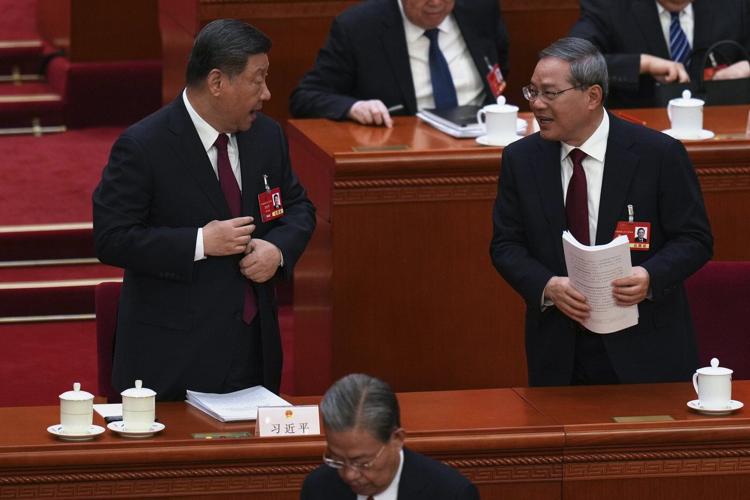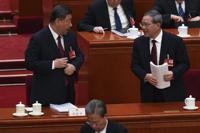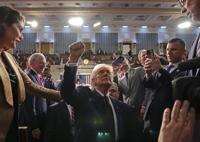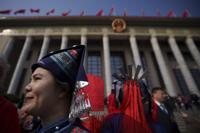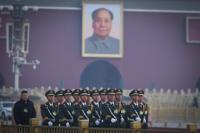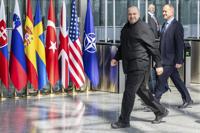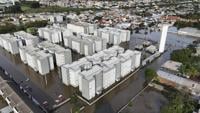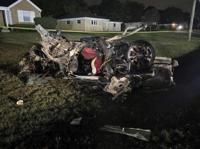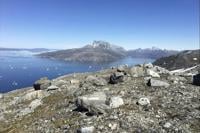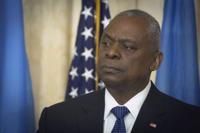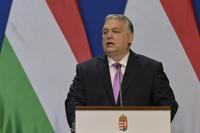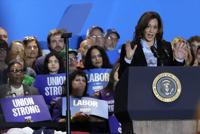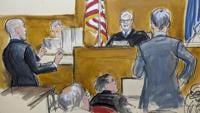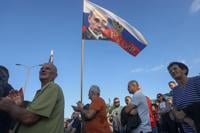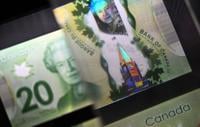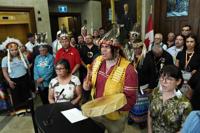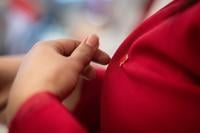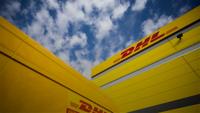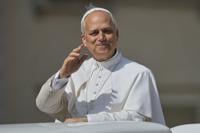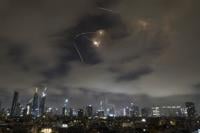BEIJING (AP) — Their words came just an hour apart this week — two major speeches by two of the world's most powerful leaders, delivered on opposite sides of the planet. Together, they illustrate the very different approaches the world's 21st-century powers are taking to achieve their respective national ambitions.
For China, it was a call for unity to overcome obstacles through innovation and “opening up” — a time-honored phrase in Chinese politics — to eventually accomplish national rejuvenation. It came from Chinese Premier Li Qiang in Beijing as he to the ��ɫtv People’s Congress, nearly 3,000 representatives from a nation of 1.4 billion people.
Seven thousand miles away and an hour later, at 9 p.m. in Washington, President Donald Trump , more than 500 lawmakers representing a nation of 340 million, as he vowed to levy tariffs on imports and defeat inflation to "make America great again" — an equally resonant phrase for many in the United States.
From setting to speaking style, the speeches were an ocean apart. Yet they struck a similar tone — that of a desire for greatness at a moment when the reigning superpower and its biggest challenger are seeing their interests increasingly at odds.
The paths their leaders choose will shape both countries' futures — and the rest of the world's, too.
Divided democracy vs. authoritarian unity
Li's speech was a set piece delivered to a loyal audience. For 55 minutes, he read a condensed version of a mostly dry and laudatory report on the government's performance last year and its plans for 2025.
He spoke from the stage of a grand, theater-like chamber in the Great Hall of the People, a monumental edifice on Beijing's renowned Tiananmen Square. China's top leader, Xi Jinping, sat on the dais behind him. The thousands of delegates arrayed before them politely applauded at the appropriate junctures.
Trump's address, which clocked at about an hour and 40 minutes, took place in the white-domed Capitol on the eastern end of the ��ɫtv Mall, dotted with national monuments. With his vice president and the Republican House speaker behind him, Trump delivered a longer, more theatrical speech to a divided Congress reflecting a divided nation.
Republicans clapped and cheered robustly at times. Democrats mostly sat in stony silence and occasionally shouted in protest. One, Rep. Al Green of Texas, early on after he stood up and interrupted the president.
Such unscripted moments — and the high emotions visible behind them — are rare in China. It is a one-party state, and the Communist Party brooks no dissent in public. It strives to present a facade of unity. In his remarks, Li praised unity and urged the country to “rally more closely” around Xi's leadership.
In Washington, Trump lamented that “there is absolutely nothing I can say to make” Democrats “happy or to make them stand or smile or applaud” and called his Democratic predecessor, Joe Biden, "the worst president in American history.”
Tariffs vs. globalization
Trump was upbeat about the economy, in the cheerleading way of American politicians pumping up support for their policies. He promised steps — including cutting energy costs — to defeat inflation, a pain point for many Americans. And he pledged to put on imports, a move he claimed would boost U.S. industries but threatens to upset the global trade order and inflict pain on China and its export-dependent economy.
“Plants are opening up all over the place. Deals are being made like never seen. That’s a combination of the election win and tariffs. It’s a beautiful word, isn’t it?” Trump said.
China is more than inflation. But Li acknowledged the other challenges the economy faces, chiefly falling real estate prices and depressed consumer spending. He reaffirmed Beijing's “unswerving commitment” to opening up.
“Regardless of changes in the external environment, we should remain steadfast in our commitment to opening up,” Li said. “We will continue to expand our globally oriented network of high-standard free trade areas."
In a statement that no doubt referred in large part to the United States, he cautioned that “an increasingly complex and severe external environment may exert a greater impact on China in areas such as trade, science and technology."
Leaving climate accord vs. green transition
Trump touted his move to withdraw from the Paris Climate Accord and described his energy policy with the moniker “drill, baby, drill.” He boasted of ending the previous administration's environmental restrictions and its electric vehicle mandate, “saving our auto workers and companies from economic destruction.”
Beijing, on the contrary, is betting on a greener economy. Li said it would be a priority to accelerate “green transition” for "all areas of economic and social development". China already has the world's largest electric vehicle industry. Echoing earlier pledges by Xi, Li said China would “actively and prudently” work towards carbon peak and carbon neutrality.
Li stressed the importance of innovation and of developing the tech economy in China, including artificial intelligence. It’s a push that many U.S. policymakers worry could challenge America’s , with impacts on both the economic and military rivalry between the two.
Trump made no mention of technology except to say that it would help build “a golden dome” missile defense shield over the U.S. He declared his focus as commander-in-chief to be “building the most powerful military of the future.” One measure, he said, was to resurrect the American shipbuilding industry. Li’s report touched on defense only briefly but said China would “speed up the development of new combat capabilities.”
MAGA vs. Chinese ‘rejuvenation’
There's something in common, too: Both countries are yearning for greatness again.
The United States, as a rising and then reigning power, dominated the second half of the 20th century and the start of the 21st. Its economy and military are still the world's most powerful. As China emerges as a rising power, its interests increasingly and inevitably collide with those of Americans and their allies over trade, technology and far-flung Pacific islands.
Today, through China's control of its domestic media, it plays up America’s divisions and violent crimes. The message to its people: It offers a better choice for their future than the messiness of democracy.
Trump presented a different view. He opened his speech much as he spent great parts of his inaugural address in January: by declaring that “America's momentum is back.”
“Our spirit is back. Our pride is back. Our confidence is back. And the American Dream is surging bigger and better than ever before,” Trump said. “Our country is on the verge of a comeback.”
Xi has fashioned what has been called the “Chinese Dream," by which the nation would be rejuvenated or restored to a position of greatness it held in centuries past.
China doesn’t necessarily want to be a leader in the U.S. sense, but it wants to be considered an equal. Concretely, China wants a greater say in setting rules in a global system long dominated by the United States.
Trump appears more intent on freeing the U.S. from global rules. Aside from the Paris agreement, he has pulled the U.S. from other global groups including the World Health Organization and the U.N. Human Rights Council — withdrawals that he held up as accomplishments in his speech.
As Trump pulls the United States back from international involvement, it creates an opportunity for China to fill the void. What’s unclear is to what extent the Communist Party thinks that doing so is in its interest and is able and willing to do so.
At the start of his speech, Li told the delegates that China has made “solid new strides” in advancing its modernization — an echo of the “Four Modernizations” that became a mantra during the rule of the late Deng Xiaoping in the late 1970s and 1980s.
In ending his report, Li, as expected, made the call that so many Chinese leaders do at these annual March meetings: “Build a great country," he said, "and advance national rejuvenation."
___
Ken Moritsugu, based in Beijing, covers China for The Associated Press. Didi Tang, a veteran China correspondent, now reports for AP from Washington, D.C.

